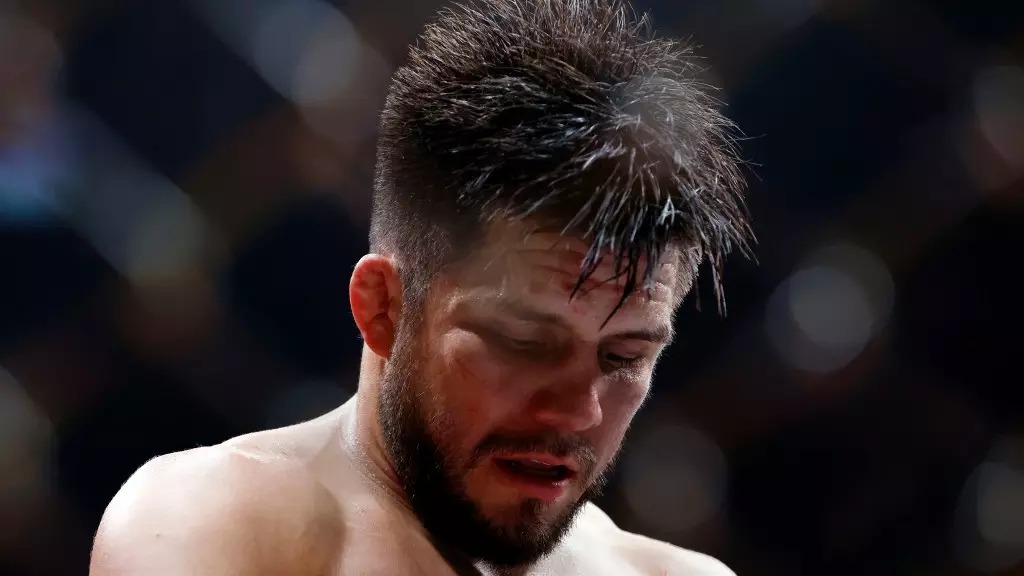Henry Cejudo, a dual-weight champion and a figure deeply embedded in the mixed martial arts (MMA) world, is grappling with the not-so-glamorous reality of a significant eye injury sustained during his recent bout against Song Yadong. This incident has not only resulted in an unexpected loss but has also ignited a deep introspection within Cejudo. Prominent fighters often possess a rigorous mental fortitude, yet an injury like this can shake even the most resolute. For Cejudo, the happenings of Fight Night 253 are not just a professional setback; they stand as a critical turning point in how he perceives risk and rewards in the octagon.
The drama of the fight unfolded during the latter stages when a controversial eye poke from Song halted the action, leaving Cejudo in a precarious state. The ensuing decision by the referees—concluding the match with a technical decision rather than a no contest—has raised eyebrows, sparking Cejudo’s dissatisfaction. He now finds himself not just with physical ramifications but also with moral and ethical dilemmas surrounding the fairness of officiating in MMA.
The Physical Toll and Ongoing Struggles
Cejudo is unflinchingly candid when it comes to discussing his ongoing eye issues. From initially being advised that the injury would heal within a month to realizing that he continues to see double, the frustration is palpable. “I sound like a crybaby, but it’s the worst injury I’ve had,” he lamented. This quote reveals more than just a fighter’s pain; it encapsulates the anxieties that accompany physical injuries which can affect one’s livelihood.
Sitting and watching television can be a simple pleasure for most, but for Cejudo, it has become a disconcerting experience. His approach to recovery has evolved significantly, marked by consultations with medical professionals—including a second opinion from Sean O’Malley’s doctor. The emotional weight of such injuries cannot be underestimated, especially as they ripple through a fighter’s psyche.
Moreover, Cejudo’s case is not unique; he draws a somber comparison to Chan Sung Jung, another fighter who faced a similar fate. The specter of retiring from the sport entirely looms over Cejudo, who passionately expresses his wish to be present for his family—highlighting the human cost of combat sports.
Facing Reality: Cejudo’s Shift in Perspective
The dimensions of Cejudo’s life are shifting as he navigates this injury. His previous retirement in 2020 came with a sense of closure, leaving the octagon when he was still on top. However, this time the reflection isn’t just on glory but on consequences. “I think this could potentially be my last fight,” he stated, a sentiment dissimilar to his earlier frustration with the sport’s dangers. It signals a metaphorical curtain drawing back to reveal a more vulnerable side of the champion, one that must consider his longevity beyond just winning or losing.
In combat sports, where physicality reigns supreme, the line between triumph and tragedy can be exceedingly thin. The candidness with which Cejudo expresses his fears about fighting with compromised vision shows growth. It reflects an understanding that while the rush of competition is undeniably alluring, the costs can be staggeringly personal. Fighters like him grapple with inherent risks—one more blow could turn into an irreversible consequence.
Cejudo’s ongoing struggle culminates in a pivotal choice: to fight once more while contemplating the fundamental question of his future in the sport. The emotional investment in a potential final fight with Song speaks to Cejudo’s desire to close this chapter on his own terms, yet it reveals the eternal conflict between a fighter’s heart and the reality of their body.
Legal Battles and Internal Conflicts
Compounding Cejudo’s challenges is the legal recourse he is pursuing against the officials involved in his last match. His claim that the referee mishandled a critical moment speaks volumes. It showcases not just the emotional ramifications of losing but raises serious questions about the adjudicative processes in MMA. Cejudo’s fight isn’t only about physical rehabilitation but also about seeking justice for what he perceives as an error that deeply impacted his career.
As much as this legal battle represents a quest for answers, it is also a reflection of the fighting spirit that Cejudo embodies. He challenges the status quo, advocating for accountability in a sport that often seems to sideline such concerns. The desire for retribution—though it may seem secondary to health—will serve as a driving force in his journey to healing.
In this brutal sport where fighters often wear their injuries like badges of honor, Cejudo’s journey highlights something often overlooked: the emotional and psychological toll that injuries can take. As he grapples with his near-future in fighting, the stakes have never been clearer or more profound. Each eye exam, each consultation, and every night spent trying to get comfortable enough to sleep is more than just a measure of recovery; it is a reflection of a fighter in his most raw and authentic form.

